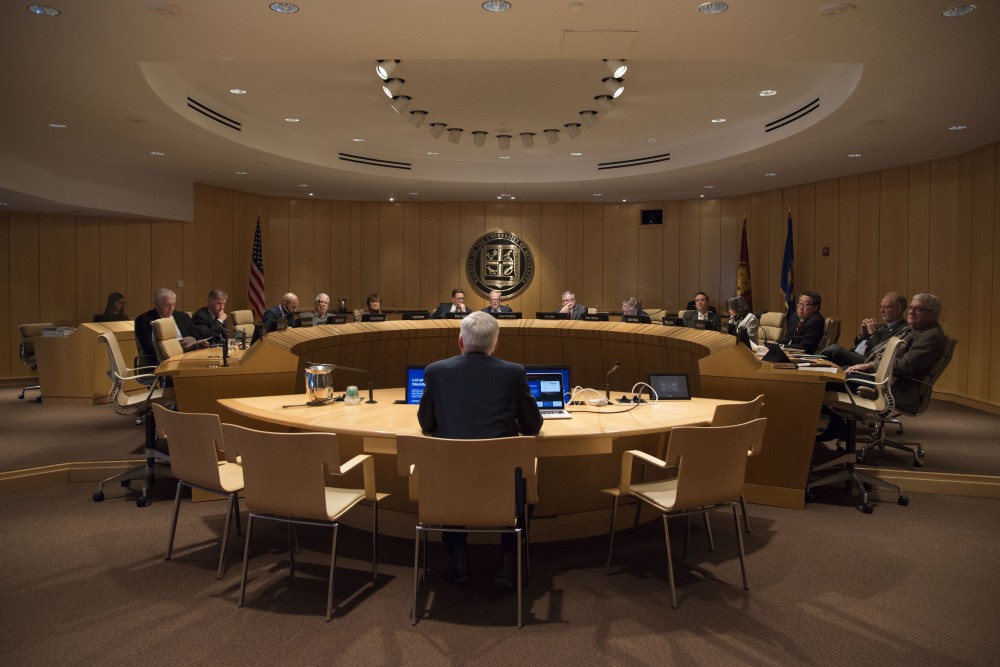Four new members of the Board of Regents at the University of Minnesota were elected by the Legislature Thursday, with lawmakers favoring diversity and new faces over incumbents.
Mary Davenport and Kao Ly Her were elected to the two at-large seats while Janie Mayeron and Mike Kenyanya will take the 5th Congressional District seat and the student regent seat, respectively.
The newly-elected regents were decided by a joint House and Senate convention Thursday following multiple delays in what has become a seven-month process. Regents are elected to serve six-year terms without pay.
“We have a very strong four candidates who prevailed, and I am very excited; all of them are new,” said Rep. Mohamud Noor, DFL-Minneapolis.
Abdul Omari, who served as the student regent for the past six years, was nominated from the floor for the 5th Congressional seat by Sen. Jeff Hayden, DFL-Minneapolis. Omari fell short by three votes to Mayeron on a mostly party-line vote. Incumbents Dean Johnson and Peggy Lucas were nominated from the floor for the at-large seats, though they were not elected.
“I got the most letters of support from actual constituents supporting Peggy [Lucas],” said Sen. Kari Dziedzic, DFL-Minneapolis, who voted for Lucas. “It was truly literally listening to my constituents.”
Davenport previously worked within the Minnesota State system, most recently as interim president of Rochester Community and Technical College until last summer. Davenport has received widespread bipartisan support.
Her is the current CEO of Hmong Elders Center, Inc. She is also the founding member of Hmong women’s advocacy nonprofit Hnub Tshiab. Her was mostly favored by Democrats.
Mayeron was a federal magistrate judge with the United States District Court of Minnesota until 2017.
Kenyanya has been the University of Minnesota — Duluth Student Association president since spring 2017.
“I think the issue we’ve been talking about is how many women will stay on the board,” Noor said. “So we wanted to diversify not only based on color of the skin or ethnicity or the background — but also in the diversity of thoughts. People who can bring a different perspective.”
Noor also said lawmakers weighed the possibility of Kenyanya’s quickly approaching graduation and possible ineligibility when deciding to finally convene for the election.
All candidates were recommended by the Regent Candidate Advisory Council in January. All four newly-elected regents were also recommended by the joint committee of House and Senate higher education committees in February.
“They had been through the RCAC [and the joint committee] … so I guess it didn’t come as a surprise. I thought the votes would be close for all the positions, and they were,” said Sen. Greg Clausen, DFL-Apple Valley, a member of both RCAC and the Senate higher education committee. “The process worked.”
Gov. Tim Walz would have appointed the regents to two-year terms had the Legislature not made a decision by May 20.
House higher education committee minority leader Rep. Bud Nornes, R-Fergus Falls, said while some lawmakers were concerned about the possibility of Walz appointing regents, he’s not sure if this was a significant factor in the Legislature setting a final date.
Nornes and others fear the lengthy process may have an impact on future regent elections.
“Next time we’re looking at regents, there may be some people hesitating about getting into the process,” he said. “It’s never been a popular or easy task, but there’ll be some that would say maybe it just isn’t worth it now.”
Madeline Deninger contributed to this report.








